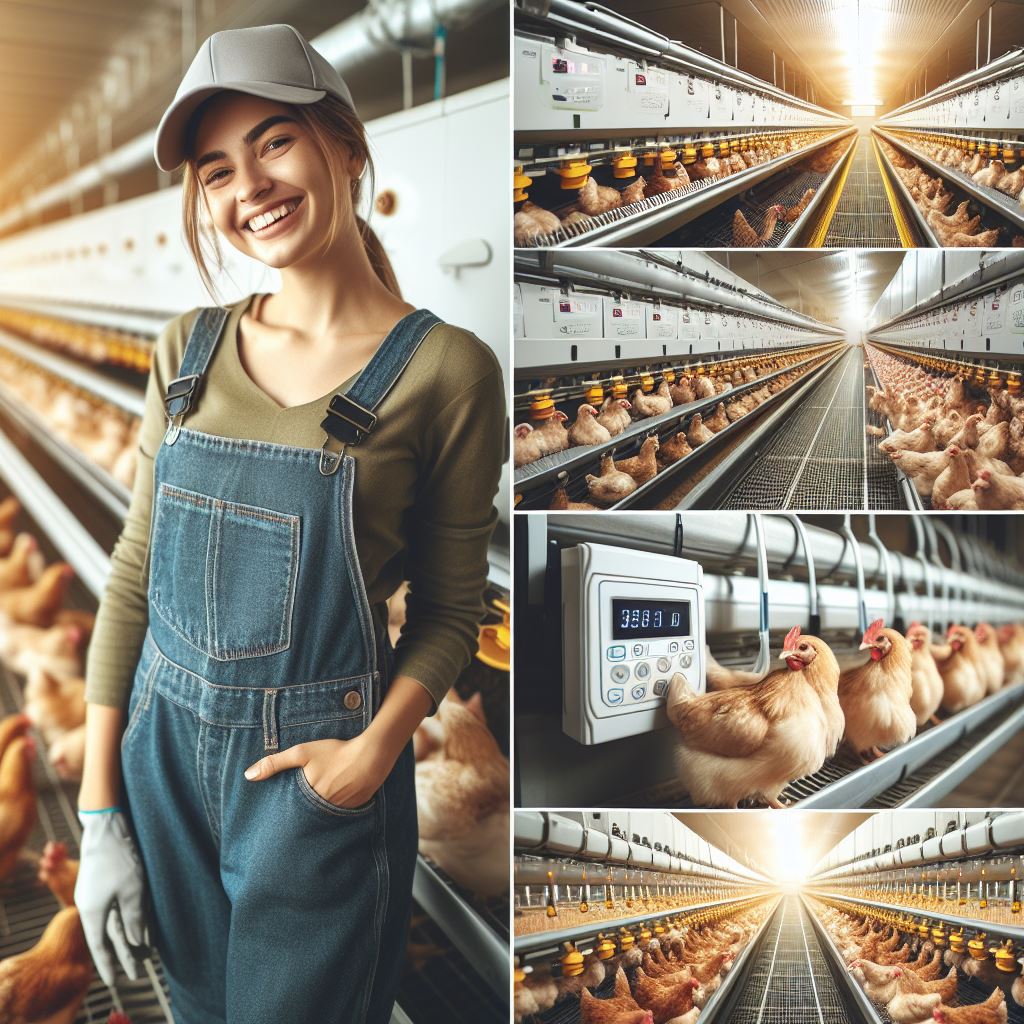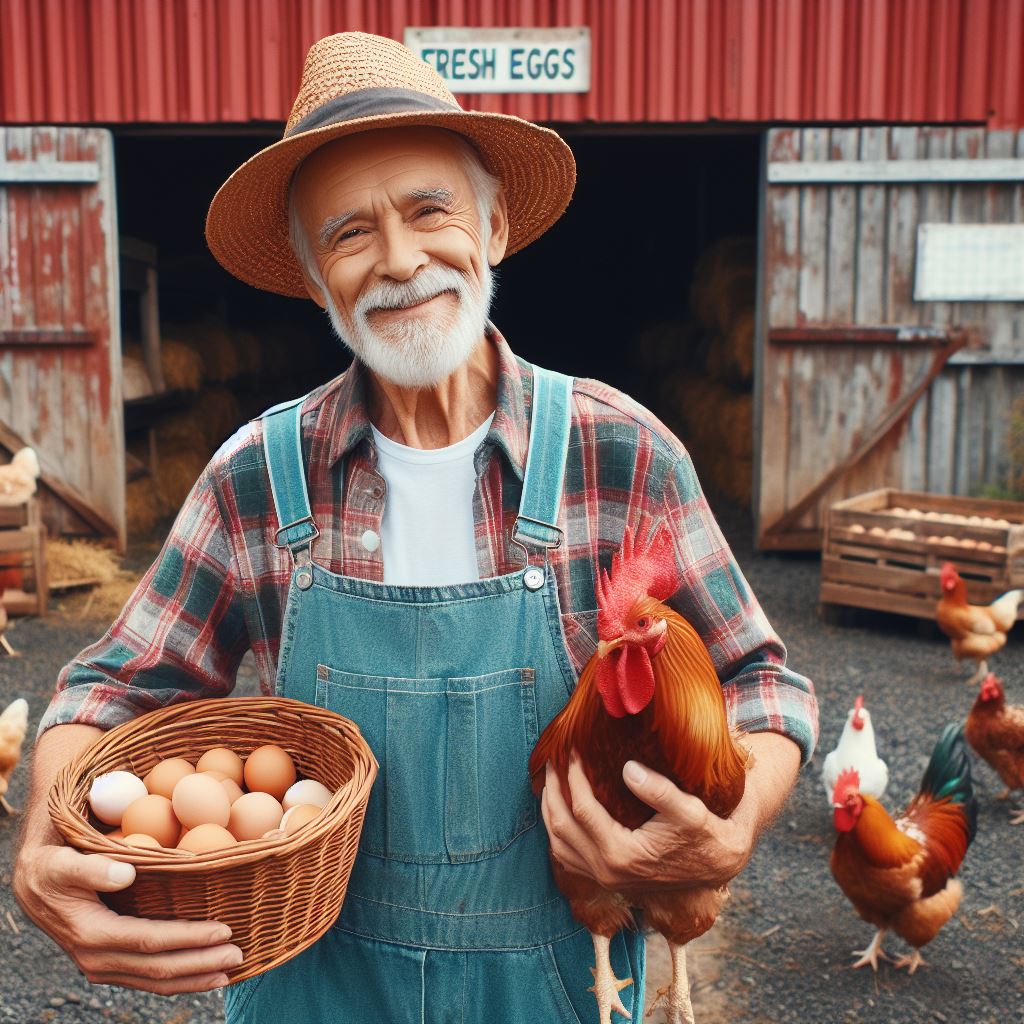Introduction
Poultry farming is an industry that involves raising domesticated birds, such as chickens, ducks, and turkeys, for their meat, eggs, or feathers.
It is a profitable venture that requires proper planning and execution.
Importance of proper planning
Proper planning is crucial in starting a poultry farm as it helps determine the feasibility and profitability of the business.
It involves conducting market research, identifying target customers, and studying the competition.
Essential steps for starting a poultry farm
When starting a poultry farm, there are several essential steps to follow.
Firstly, you need to choose the type of poultry you want to raise and the purpose of the farm – whether for meat production, egg production, or both.
Next, you must secure a suitable location for the farm, ensuring there is enough land, access to clean water, and proper infrastructure for housing and feeding the birds.
Afterward, you need to acquire the necessary equipment and supplies, such as housing structures, feeders, drinkers, and temperature control systems.
Proper biosecurity measures should also be implemented to prevent the spread of diseases.
Furthermore, it is vital to obtain the required permits and licenses to operate legally and comply with regulations regarding animal welfare and food safety.
Before starting your poultry farm, it is important to create a detailed business plan that includes financial projections, marketing strategies, and contingency plans.
In general, starting a poultry farm requires thorough planning and adherence to essential steps.
With the right preparation, dedication, and knowledge, you can establish a successful and profitable poultry farming business.
Research and Planning
Conduct Market Research
Before starting a poultry farm, it is crucial to conduct thorough market research.
Identify potential customers and their demands.
Transform Your Agribusiness
Unlock your farm's potential with expert advice tailored to your needs. Get actionable steps that drive real results.
Get StartedDetermine Target Market and Customers
Once you have gathered market research data, determine your target market and focus on understanding their preferences and needs.
Assess the Competition
Analyze existing poultry farms in your area. Study their production methods, pricing strategies, and customer satisfaction levels.
Develop a Business Plan
Creating a comprehensive business plan is essential for the success of your poultry farm.
Mission Statement and Goals
Your business plan should include a clearly-defined mission statement reflecting your farm’s purpose and goals.
Financial Projections
Include detailed financial projections that encompass all aspects of your poultry farm, such as production costs, revenue streams, and anticipated profits.
Marketing Strategies
Outline effective marketing strategies to promote your poultry products and attract potential customers.
Utilize both traditional and digital channels.
Risk Assessment and Contingency Plans
Identify potential risks and develop contingency plans to mitigate them.
This can include disease outbreaks, market fluctuations, or equipment failures.
Choosing the Right Location
Consider Proximity to Markets
Select a location that is close to your target market to minimize transportation costs and ensure fresh product delivery.
Access to Essential Resources
Ensure that your chosen location provides easy access to key resources such as feed suppliers, veterinary services, and labor.
Availability of Suitable Land
Find land that is suitable for poultry farming. Consider factors such as soil quality, drainage, and availability of utilities.
Comply with Local Regulations
Before finalizing a location, familiarize yourself with local regulations and zoning laws that may affect your poultry farm operations.
Building Infrastructure
Choose Appropriate Housing System
Determine the housing system that best suits your farm, whether it’s free-range, barn, or battery cage system.
Transform Your Agribusiness Online Presence
Stand out with compelling content tailored to engage your audience and drive results. From blog posts to social media, we’ll create what your business needs to grow.
Get StartedEnsure Adequate Space and Ventilation
Provide sufficient space for the number of chickens you plan to raise and ensure proper ventilation to maintain a healthy environment.
Invest in Quality Equipment and Facilities
Purchase reliable equipment and facilities that meet the specific needs of your poultry farm, such as feeders, waterers, and nesting boxes.
Implement Biosecurity Measures
Develop and follow strict biosecurity protocols to prevent the entry and spread of diseases among your poultry flock.
Procuring and Raising Poultry
Select Suitable Poultry Breeds
Choose poultry breeds that suit your market demand and production objectives.
Consider factors such as egg-laying capacity, meat quality, and disease resistance.
Source Quality Chicks or Hatching Eggs
Connect with reputable suppliers to ensure the procurement of healthy chicks or hatching eggs that are free from diseases.
Provide Proper Nutrition and Hydration
Develop a balanced feeding program that meets the nutritional requirements of your poultry.
Ensure a constant supply of clean water.
Implement Vaccination and Health Protocols
Follow a vaccination schedule and implement regular health check-ups to maintain strong immunity and prevent disease outbreaks.
Marketing and Sales
Create a Brand Identity
Develop a compelling brand identity that resonates with your target market.
This includes a catchy logo, appealing packaging, and consistent messaging.
Establish Distribution Channels
Identify and partner with distribution channels that align with your target market, such as supermarkets, restaurants, or direct-to-consumer sales.
Utilize Online Marketing Strategies
Leverage the power of online platforms to reach a wider audience, such as social media marketing, e-commerce websites, and online advertisements.
Build Customer Relationships
Focus on building strong relationships with your customers through excellent customer service, personalized interactions, and loyalty programs.
Unlock Farming Insights for Growth
Make smarter farming decisions with detailed reports on market trends, weather patterns, and soil health tailored to your farm's success. Boost productivity with actionable data.
Get ReportIn essence, starting a poultry farm requires meticulous research, strategic planning, and careful execution.
By thoroughly understanding your target market, assessing competition, and developing a robust business plan, you can set your poultry farm on the path to success.
Remember to pay attention to location selection, infrastructure development, and the proper care and raising of poultry.
Additionally, effective marketing and sales strategies will help you establish your brand and secure a loyal customer base.
Choosing the Right Poultry Species
Choosing the right poultry species is crucial for the success of your poultry farm.
It will determine the type of products you will produce and the potential profitability of your enterprise.
Here are some essential steps and tips to help you make the right choice.
Identify the type of poultry farm
The first step in choosing the right poultry species is to identify the type of farm you want to start.
Do you want to focus on meat production, egg production, or both.
Each type has its own specific requirements and considerations, so it’s important to have a clear vision of your farm’s objectives.
Research different poultry species
Once you have identified the type of poultry farm you want to start, it’s time to research the different poultry species available.
There are various breeds of chickens, ducks, turkeys, and geese, each with different characteristics and production potentials.
Gather information about the pros and cons of each species to make an informed decision.
Consider market demand, production requirements, and profitability
When choosing a poultry species, it’s important to consider market demand, production requirements, and profitability.
Research the market demand for different poultry products in your area.
Evaluate the production requirements, such as housing, feeding, and disease resistance, to ensure that you can meet the needs of your chosen species.
Additionally, analyze the potential profitability of each species based on their production costs and expected market prices.
Select a poultry species suitable for the local climatic conditions
Local climatic conditions play a significant role in the success of your poultry farm.
Different poultry species have different temperature and humidity requirements.
Some species may be more adaptable to extreme weather conditions, while others may require additional measures to provide a suitable environment.
It’s essential to select a poultry species that can thrive in your local climate without compromising their health and productivity.
In summary, choosing the right poultry species is a crucial decision that will impact the success of your poultry farm.
By identifying the type of farm, researching different species, considering market demand and production requirements, and selecting a species suitable for your local climatic conditions, you can ensure a profitable and sustainable poultry enterprise.
Secure Suitable Land and Facilities
Starting a poultry farm is an exciting venture that requires careful planning and consideration.
One of the essential steps in this process is securing suitable land and facilities.
Here are some important factors to consider when embarking on this journey:
Identify suitable land for the poultry farm
Look for a location that is conducive to poultry farming, preferably away from residential areas.
Consider factors such as availability of utilities and proximity to markets.
Evaluate the landscape, soil quality, and accessibility to water
Ensure that the land is suitable for poultry farming.
The landscape should be flat or gently sloping, allowing for easy construction of facilities.
The soil should be of good quality and capable of supporting vegetation required for feed production.
Access to a reliable water source is crucial for poultry health and hygiene.
Purchase or lease the land
Once you have identified a suitable piece of land, you will need to decide whether to purchase or lease it.
Consider financial aspects, long-term plans, and legal implications before making a decision.
Construct or modify existing facilities
Depending on the size of your farm, you will need to construct or modify existing facilities to accommodate your poultry.
Here are some key components to focus on:
Poultry houses, brooders, and coops
These structures provide shelter and protection to your poultry.
Ensure they are well-ventilated, spacious, and designed to prevent the entry of predators.
Ventilation and temperature control systems
Proper ventilation is essential for maintaining a healthy environment inside the poultry houses.
Install fans, air vents, and cooling systems to regulate temperature and humidity.
Feeding and watering systems
Implement an efficient feeding and watering system to ensure your poultry’s nutritional needs are met.
Consider automatic feeders and waterers for convenience and to minimize waste.
Waste disposal systems
Adequate waste management is crucial for maintaining hygiene and preventing the spread of diseases.
Implement a system for proper disposal or recycling of poultry waste, such as composting or anaerobic digestion.
By securing suitable land and facilities, you lay a strong foundation for your poultry farm.
Consider consulting with experts in poultry farming to ensure that all aspects are thoroughly evaluated and addressed.
Remember to comply with local regulations and health standards to guarantee a successful and sustainable venture.
Overall, securing suitable land and facilities is a vital step when starting a poultry farm.
Identify quality land, evaluate landscape and water accessibility, and decide whether to purchase or lease the land.
Construct or modify facilities to provide adequate shelter, ventilation, feeding and watering systems, and waste disposal mechanisms.
By taking these essential steps, you set the stage for a thriving poultry farm.
Read: Livestock Management: Diverse Animal Care

Purchase Equipment and Supplies
When you are starting a poultry farm, one of the key steps is to purchase the necessary equipment and supplies.
This will ensure that your farm is properly equipped to raise healthy and productive chickens.
Here are some essential steps to consider:
Determine the required equipment and supplies
Begin by making a list of all the equipment and supplies you will need for your poultry farm.
This may include feeders, drinkers, feed storage containers, lighting systems, egg incubators (if applicable), cleaning and disinfection equipment, and biosecurity measures.
Research suppliers and compare prices
Take the time to research different suppliers for the equipment and supplies you need.
Look for reputable suppliers that offer quality products at reasonable prices. Compare prices from multiple suppliers to find the best deals.
Purchase essential equipment
Once you have identified the required equipment and found reliable suppliers, it’s time to make your purchases.
Here are some essential equipment and supplies to consider:
Feeders, drinkers, and feed storage containers
Invest in high-quality feeders and drinkers that are suitable for the number of chickens you plan to raise.
Also, ensure you have adequate feed storage containers to keep the feed fresh and protected from pests.
Lighting systems
Proper lighting is crucial for the overall health and productivity of your chickens.
Invest in lighting systems that mimic natural daylight patterns and provide the right amount of light for different stages of growth.
Egg incubators (if applicable)
If you plan to hatch your own chicks, consider purchasing egg incubators.
These devices provide the optimal conditions for successful egg incubation, ensuring a higher hatch rate and healthier chicks.
Cleaning and disinfection equipment
Keeping your poultry farm clean and hygienic is essential to prevent the spread of diseases.
Purchase cleaning and disinfection equipment such as brushes, brooms, cleaning solutions, and disinfectants to maintain a sanitary environment.
Biosecurity measures
Implementing biosecurity measures is critical to protect your poultry farm from diseases and pests.
Purchase biosecurity products such as footbaths, hand sanitizers, and biosecurity signage to minimize the risk of contamination.
By taking the time to research and purchase the necessary equipment and supplies, you are setting your poultry farm up for success.
Investing in quality equipment will ensure the well-being of your chickens and contribute to the overall efficiency and profitability of your farm.
Acquire Quality Breeds and Chicks
When starting a poultry farm, one of the most essential steps is acquiring quality breeds and chicks.
Here are some tips to help you with this crucial aspect:
- Research reputable suppliers or hatcheries: It is important to find trustworthy suppliers or hatcheries that have a good reputation in providing healthy and high-quality poultry breeds.
- Choose appropriate breeds for the desired poultry products: Consider the type of poultry products you want to produce, such as meat or eggs, and select breeds that are suitable for those specific purposes.
- Consider health, productivity, and adaptability of the breeds: Look for breeds that are known for their good health, high productivity, and ability to adapt to different environments and management systems.
- Inspect and select healthy chicks or eggs: Before finalizing your purchase, closely inspect the chicks or eggs for any signs of disease or weakness. Choose only healthy individuals.
Finally, Acquiring quality breeds and chicks is crucial for the success of your poultry farm.
It ensures that you have a solid foundation for a productive and profitable business.
By following the tips mentioned above, you can make informed decisions and set yourself up for success.
Establish Proper Care and Management Practices
Starting a poultry farm is a complex process that requires careful planning and attention to detail.
One of the essential steps in establishing a successful poultry farm is to establish proper care and management practices.
This section will outline the key practices that should be implemented to ensure the health and well-being of the flock.
Develop a feeding program in consultation with a poultry nutritionist
Proper nutrition is essential for the growth and development of poultry.
Consult with a poultry nutritionist to design a feeding program that meets the specific needs of your flock.
This program should include a balanced diet with the right combination of proteins, carbohydrates, fats, vitamins, and minerals.
Provide clean water and appropriate supplements
Water is a vital component of poultry nutrition.
Ensure that clean, fresh water is readily available to the birds at all times.
Additionally, consider incorporating appropriate supplements such as probiotics or vitamins into their diet to support their overall health and immune system.
Monitor and maintain the necessary temperature and humidity levels
Poultry are sensitive to temperature and humidity fluctuations.
Maintain the appropriate temperature and humidity levels in the poultry house, especially during critical stages like brooding or extreme weather conditions.
This can be achieved using heaters, fans, insulation, and ventilation systems.
Design a vaccination and disease prevention program
Vaccinations play a crucial role in preventing the outbreak of diseases in poultry.
Work with a veterinarian to develop a vaccination schedule that aligns with the specific diseases prevalent in your region.
Regularly administer the necessary vaccines to every bird to safeguard their health and prevent diseases from spreading.
Implement biosecurity measures to prevent disease outbreaks
Biosecurity is vital in protecting your flock from diseases brought in by vectors such as contaminated equipment, visitors, or even wild birds.
Establish strict biosecurity protocols, including foot baths, restricted access to the farm, and regular disinfection of equipment and facilities.
Also, segregate different age groups of birds to minimize the risk of disease transmission.
By following these essential care and management practices, you can ensure the health and well-being of your poultry flock.
Proper nutrition, clean water, temperature control, vaccinations, and biosecurity measures are all critical components of a successful poultry farm.
Investing time and effort into these practices will help minimize disease outbreaks, maximize productivity, and ultimately contribute to the success of your poultry business.
Remember, attention to detail, regular monitoring, and continuous learning are key to maintaining a healthy and productive poultry farm.
Stay updated with the latest advancements in poultry nutrition, disease prevention, and management practices to ensure that your flock thrives and meets its full potential.
Read: Sustainable Livestock Farming Tactics
Marketing and Sales Strategies
- Define your target market and identify your ideal customers.
- Create a branding strategy that reflects the values and uniqueness of your poultry farm.
- Set competitive prices for your poultry products by considering your production costs, market demand, and competitor pricing.
- Establish distribution channels and partnerships with local retailers, restaurants, and supermarkets.
- Create eye-catching promotional materials such as flyers, brochures, and posters to attract potential customers.
- Build an online presence through social media platforms, a website, and online marketplaces.
- Engage with customers through regular updates, promotions, and customer feedback.
Financial Management and Record Keeping
Proper financial management and record keeping are crucial for the success of any poultry farm.
By effectively managing your finances, you can maintain a stable cash flow and make informed business decisions.
Here are some essential steps and tips to help you in this aspect of your poultry farming venture.
Allocate a budget for various expenses
Creating a budget is the foundation of financial management.
Allocate funds for all the necessary expenses including feed, equipment, labor, marketing, and infrastructure.
This will help you understand your financial commitments and plan accordingly.
Monitor income and expenses closely
Keep a close eye on your income and expenses by regularly reviewing your financial statements.
This will allow you to identify any discrepancies or areas where you can cut costs and increase revenue.
Keep thorough records of sales, expenditures, and production data
Maintain detailed records of all your business transactions.
This includes sales records, receipts, invoices, and production data.
Accurate record keeping will help you track your financial progress and provide valuable information for future planning.
Regularly evaluate financial performance
Review your financial performance on a regular basis.
This will help you identify any potential financial issues or areas of improvement.
Analyze key financial ratios such as profitability, liquidity, and solvency to gain insights into the overall health of your business.
Adjust business strategies based on financial analysis
Based on your financial analysis, make necessary adjustments to your business strategies.
This may involve implementing cost-cutting measures, exploring new marketing avenues, or diversifying your product offerings.
Use your financial data as a guide to make informed decisions.
In summary, financial management and record keeping are vital aspects of running a poultry farm.
By allocating a budget, monitoring income and expenses closely, keeping thorough records, regularly evaluating financial performance, and adjusting business strategies based on financial analysis, you can enhance the profitability and sustainability of your poultry farming venture.
Read: Poultry Management: Key Techniques
Uncover the Details: Swine Diets Decoded: What Your Pigs Need
Seek Professional Advice and Support
Starting a poultry farm is a demanding venture that requires not only passion and hard work, but also knowledge and expertise in the industry.
To ensure a successful and profitable operation, it is essential to seek professional advice and support from various sources.
Consult with veterinarians, poultry specialists, and agricultural extension services
Veterinarians and poultry specialists possess the necessary knowledge and experience to help you establish and maintain a healthy flock.
Their expertise in areas such as disease prevention, nutrition, and proper housing can greatly benefit your poultry farm.
Agricultural extension services can provide valuable information and resources specific to your area, helping you navigate local regulations and best practices.
Attend training programs and workshops
Regularly attending training programs and workshops is crucial to staying updated on the latest advancements in poultry farming.
These educational opportunities can enhance your understanding of poultry management techniques, disease control measures, and efficient production practices.
By continuously learning and improving your skills, you can optimize your farm’s performance and profitability.
Join industry associations and networks
Being part of industry associations and networks allows you to connect with fellow poultry farmers and industry experts.
These platforms provide opportunities for knowledge sharing, networking, and collaboration.
By participating in discussions, attending seminars, and engaging in cooperative projects, you can gain valuable insights and support from others who have faced similar challenges.
Seek mentorship from experienced poultry farmers
Having a mentor who has successfully established and managed a poultry farm can be incredibly beneficial.
They can provide guidance, share their experiences, and offer practical advice that may not be found in textbooks or online resources.
A mentor can help you avoid common pitfalls, make informed decisions, and assist you in overcoming any obstacles you encounter along the way.
Stay updated with industry trends and regulations
The poultry industry is constantly evolving, with new trends and regulations emerging regularly.
To stay ahead, it is essential to stay updated with these changes.
Subscribe to industry publications, follow reputable online sources, and attend industry conferences to ensure that your farm is aligned with the latest industry practices and compliant with regulations.
In essence, seeking professional advice and support is crucial when starting a poultry farm.
Consulting with veterinarians, poultry specialists, and agricultural extension services can provide you with the expertise and knowledge necessary to manage a healthy flock.
Attending training programs, joining industry associations, and seeking mentorship from experienced farmers can enhance your skills and expand your network within the industry.
Lastly, staying updated with the latest industry trends and regulations ensures that your farm remains competitive and compliant.
By taking advantage of these resources, you increase your chances of running a successful and profitable poultry farm.
Read: Layer vs. Broiler: Choosing Your Poultry Path
Conclusion
The importance of careful planning and preparation for starting a poultry farm
In closing, starting a poultry farm requires careful planning and preparation.
It is vital to do thorough research, create a business plan, and secure necessary permits and funding.
Building appropriate infrastructure, choosing the right breed, and implementing effective biosecurity measures are also crucial.
The essential steps and tips discussed in the blog post
Throughout this blog post, we have discussed essential steps and tips, including selecting suitable land, constructing necessary facilities, procuring quality birds, and ensuring proper feeding and healthcare.
We have emphasized the significance of learning from experienced farmers and consulting experts in the field.
It is important to understand that starting a poultry farm is not an easy task and requires dedication, hard work, and perseverance.
However, with the right knowledge and passion, it can be a rewarding venture both financially and personally.
Encouragement for readers to take action and pursue their dream of starting a poultry farm
We encourage our readers to take action and pursue their dream of starting a poultry farm.
It is essential to incorporate the advice and recommendations discussed in this blog post into their planning process.
By being proactive in their approach and staying committed to their goals, readers can overcome challenges and achieve success in their poultry farming endeavors.
Remember, a well-organized and carefully managed poultry farm can become a profitable business, providing a sustainable source of income and contributing to the local economy.
So, go ahead and start your journey towards establishing your own poultry farm today!




